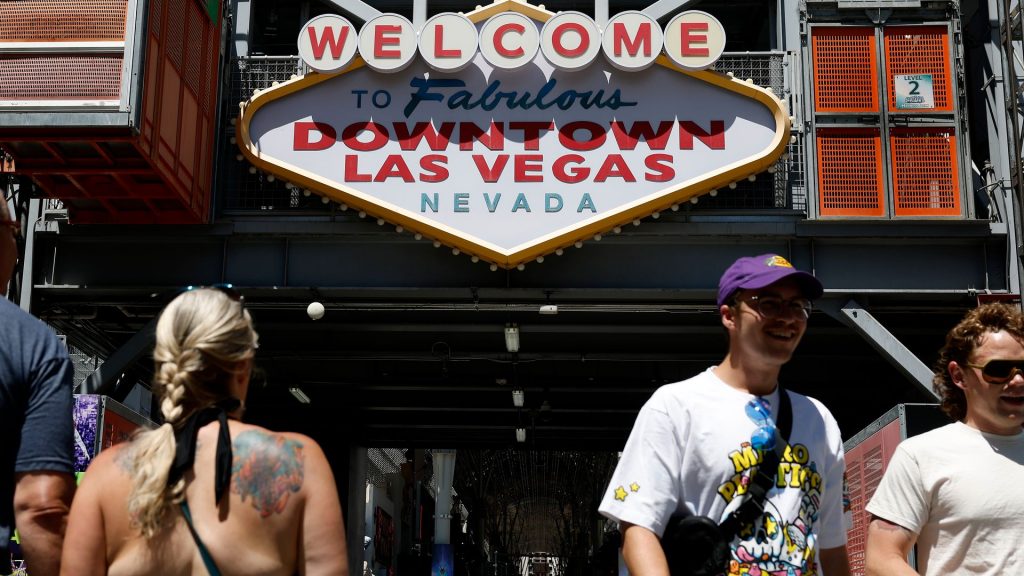What’s behind the Vegas tourism drop, and what does it mean for other cities?

LAS VEGAS — Starting from his days as a busboy at the Sands, Teddy Pappageorge has seen the evolution and all the turmoil Las Vegas has endured as a 42-year member of Culinary Union Local 226, the largest in Nevada. Now serving as secretary-treasurer for 60,000 hospitality workers, he does not mince words about the economic outlook Las Vegas has faced in recent months. He paints it as a warning to other cities.
“When the economy sneezes, Vegas gets the flu,” Pappageorge told Straight Arrow News.
Those words ring as a reminder that Las Vegas’ status as one of America’s crown jewels of tourism is often dependent on a healthy national economy.
Immigration policies and evolving tariff proposals have taken a toll on the city’s economy and job prospects, affecting tourism, housing and the cost of living. Those factors, alongside rising costs for tourists and locals, along with a high unemployment rate, suggest people are spending their money elsewhere. And residents are feeling the squeeze.

How big is the drop in tourism to Vegas this year?
According to June data from the Las Vegas Convention and Visitors Authority (LVCVA), tourism fell 11.3% compared to the same month last year, a loss of roughly 400,000 visitors.
Strip hotel occupancy also slipped to 78.7%, and average nightly hotel rates dropped to $163.70, down 6.6% year-over-year.
International travel has plummeted. Canadians — who comprise nearly a third of the city’s foreign visitors — have skipped Vegas altogether, with summer bookings down by roughly 20% nationwide compared to last year, according to the World Travel & Tourism Council (WTTC). Tourists from Mexico make up a significant amount of those numbers as well.
The WTTC study, which analyzed the economic impact of tourism in 184 countries, found that the U.S. was the only economy forecasted to see international visitor spending decline in 2025, equating to a $12.56 billion loss in revenue.
The LVCVA study also indicates that Californians, the largest group of domestic travelers to Vegas, are visiting less. Traffic from Interstate-15, which borders both states, dipped 4.3% this year. Californians make up over a fifth of the overall travelers to the city.
The LVCVA declined requests for further comment.
Slowdowns in tourism often creep into other sectors of the economy, such as construction, retail, transportation and food and beverage, Pappageorge said. He pointed to other major cities that have felt the same effects, including Boston, New York City and Miami.
“In every major metropolitan area, travel tourism is number two or three in revenue,” Pappageorge told SAN. “When you see a significant reduction in travel, it’s going to hit this economy hard.”
Las Vegas welcomed 1.5 million fewer tourists in the first half of 2025 than during the same period last year, a 7.3% decrease, according to LVCVA data.

How do politics and pricing affect Vegas?
Marta Soligo, a sociology professor at the University of Nevada, Las Vegas (UNLV) who studies tourism trends, told SAN that negative global views of America have affected inbound tourism. An Italian citizen, Soligo said some Europeans are afraid to travel to the U.S. over concerns about immigration and customs procedures for foreign travelers.
Some opt instead for other destinations, she told SAN. Others are traveling less altogether due to economic uncertainty.
“Even if some people have a good income, they are becoming increasingly cautious about spending money on tourism, because the future looks uncertain, and they prefer to save it for rainy days,” she told SAN.
Pappageorge shared Soligo’s sentiment. He said the Culinary Union, which is a majority Latino labor organization, is also reacting with fear and anger at what they see unfolding during ICE raids and other rhetoric against its members.
“When you let the rest of the world know you’re not welcome, it causes repercussions,” he said. “The economy was the number one issue during the election, and now we’re seeing Marines round dishwashers and landscapers for culture wars. This is not what many people voted for.”
Amanda Belarmino, a hospitality professor at UNLV, said pricing has had a greater effect than politics. One example: The famed Flamingo casino hotel increased the cost of resort fees to renovate the pool.
“The city has always been known as a value destination, and now it’s being seen as a luxury,” Belarmino told SAN. “When you go viral for $25 cocktails, that’s not helpful.”

Is Vegas a ‘rich-only adult’s playground’?
Erica Padilla, a cocktail server at Circa, said the situation is stressful as slower activity triggered fewer working hours for herself and others. Even staple events like the NBA Summer League failed to bring in significant traffic.
“The number of tourists just aren’t there,” she said. “Everyone in the casino I work for is noticing. People are getting laid off or their hours reduced — and that’s going to affect how much money they’ll have to pay out of pocket just to keep their health insurance.”
The strip has become “a ghost town,” she said.
“Caesar’s, Aria and MGM were laying food and beverage people off and cutting their hours,” she told SAN. “Summer is our slowest [period] because everyone wants to be at the day clubs, but people have been getting laid off at the strip.”
At the same time, Vegas prices are rising significantly. According to MarketWatch, room rates have increased by 70% since 2015. Hidden resort fees can also creep up on visitors as well, taking a hotel booking that costs $129 to $190 or more, according to The Street.
“Vegas is … a rich-only adult’s playground,” Padilla said. “The prices of food and beverage have skyrocketed on the strip and downtown — it feels like a money grab instead of a fun getaway.”

How does the housing market affect the Vegas economy?
Nevada is among the fastest-growing states in the country, ranking sixth in population growth from 2023-2024 according to U.S. Census Bureau data. That growth has brought other complications for those looking to work in the city.
Las Vegas’ unemployment rate is 5.9%, ranking the third highest in the nation with a metro population of over 1 million people, according to the U.S. Bureau of Labor and Statistics. Yet home prices are rising. The median price of single-family homes sold in Southern Nevada this June reached $485,000, a record high for the area.
Jack Greenberg, a Las Vegas realtor, told SAN that while prices have remained relatively stable due to continued demand from out-of-state buyers and limited new construction, the first half of the year has been a mixed bag.
“Tourism is a critical driver of our local economy, and dips in visitor volume do impact certain segments,” he said. “Elevated unemployment has softened demand among local buyers, especially first-time purchasers and renters who are already stretched.”
Greenberg has been in the Las Vegas real estate market for over two decades, overseeing the early 2000s boom, the 2008 crash and the COVID-19 surge.
Pappageorge told SAN he is concerned this current downturn could mirror long-term damage felt after the real estate crash of the early aughts, during which Nevada recorded more home foreclosures than any other state.
“It took 10 years for Vegas to recover from the ‘08 crash,” Pappageorge said. “The numbers from last year were moving up and we were expecting it to be a banner year.”
Then came the tourism drop.

What will it take for Vegas to rebound?
The Culinary Union has moved to strengthen itself; with the Venetian and Fontainebleau both joining the union, there is now union representation across all major casinos in the city, according to Yogonet. The latest five-year labor agreements include a 32% increase in pay, with union members set to earn an average of $35 per hour, including benefits, by the end of the contract term.
Pappageorge urges that there be a correction in tourism and ensuring the city is safe to visit and work in before the damage becomes long-lasting for workers and tourists.
While this summer has been rough, Belarmino predicted the economy will rebound by November. Vegas isn’t “dying,” she told SAN. And the return of sporting events such as the NFL and Formula 1 later in the year will help accommodate lower gambling revenue over the summer, she said.
“We have rebounded much faster from the pandemic than expected and have diversified with sports and the film industry. We see a lot of positive potential over the next several years,” Belarmino told SAN. “It has always been a criticism of Southern Nevada that we’re too dependent on the tourism industry, but I believe the city has done what it can to diversify.”
Soligo is less optimistic.
“The uncertain economic situation, combined with the tariffs, which could significantly harm small businesses, makes it challenging to predict a positive future,” Soligo said.





